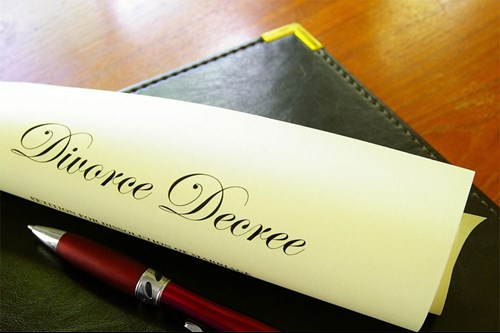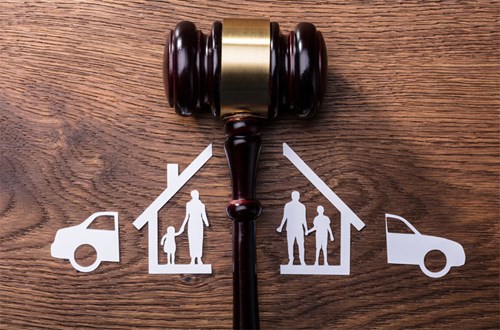Protecting the Children During A Divorce or Separation
 Going through a divorce or separation is an exceptionally difficult time for all parties involved. But when there are children to consider too, it can be even harder. Making arrangements for looking after your children is a necessary step that must be undertaken in the event of a divorce or separation, and providing you and your ex-partner can agree on these, it may be possible to avoid going to court.
Going through a divorce or separation is an exceptionally difficult time for all parties involved. But when there are children to consider too, it can be even harder. Making arrangements for looking after your children is a necessary step that must be undertaken in the event of a divorce or separation, and providing you and your ex-partner can agree on these, it may be possible to avoid going to court.
For example, if you can agree on where the children will live, how much time they’ll spend with each parent, and how you’ll financially support them, there’s no need to go to a court hearing. You can, of course, use a solicitor to make the arrangement you have agreed on legally binding, which may be a sensible option.
Ensuring the Best Interests of your Children
Mediation can be a good way to get help agreeing on child arrangements, as the mediator will be able to give impartial advice without taking sides. If this fails, however, and you and your ex-partner are unable to agree on the above points, engaging a solicitor is an effective way of ensuring the best possible arrangements are made that are in the very best interests of your children.
What is a Child Arrangements Order?
Formerly known as Residence Orders and Contact Orders, a Child Arrangement Order may be required from the Court to decide where the child will live and what contact they should have with the other parent. If shared care is ordered, this doesn’t always mean that the time is split between the parents in an equal fashion.
What about Parental Responsibility?
Only those with parental responsibility can apply for a Child Arrangement Order. For example, if the father of the children is not married to the mother, and is not registered on the children’s birth certificate, he will not automatically have parental responsibility. If the father is registered on the children’s birth certificate, but this happened before December 2003, he will also not automatically have parental responsibility.
If you don’t have Parental Responsibility of the child, you will need to request permission from the Court to make a separate application for this. However, this can be avoided if the other parent is willing to sign a Parental Responsibility Agreement with you.
What Does a Child Arrangement Order Involve?
In short, a Child Arrangement Order involves formalising the decisions of who your child or children should live with, how much time they should spend with the other parent, and the logistics involved in that with regard to timings and contact. For any specific decisions regarding your child’s upbringing such as where they go to school, decisions surrounding medical care, or whether they should receive a religious education, a Specific Issue Order can be arranged. You can also apply for a Prohibited Steps Order to stop the other parent from making a decision about the child’s upbringing, for example, moving abroad without the consent of the other parent.
Here at Vines Legal, we’re experts in helping our clients through the process of separation and divorce. If you are considering a separation, or going through a divorce, and want to ensure that you protect your children during the process, please contact us on 01246 555610 for a free initial consultation where we can explain all of the options available to you.
By Vines Legal on 14 Sep 2020
FAQs - Your Divorce Questions Answered
 As experts in matrimonial and family law, we’ve been asked just about every question possible when it comes to divorce and separation. And as you can imagine, we are well versed in providing factual, trustworthy and honest answers! Questions are bound to come at all stages of the divorce process. That’s why we’ve compiled a summary of frequently asked questions and answers, in an attempt to make what can be an extremely challenging time that little bit easier.
As experts in matrimonial and family law, we’ve been asked just about every question possible when it comes to divorce and separation. And as you can imagine, we are well versed in providing factual, trustworthy and honest answers! Questions are bound to come at all stages of the divorce process. That’s why we’ve compiled a summary of frequently asked questions and answers, in an attempt to make what can be an extremely challenging time that little bit easier.
How Long Does it Take to Get a Divorce?
Starting the divorce process may seem like a daunting and potentially lengthy prospect. But in reality, it can take between approximately 4 and 6 months to obtain a divorce, although the Coronavirus pandemic has increased these timescales at present. There may be complications, however, that can considerably extend the process, including complex financial issues, child arrangements, assets, property, and pensions.
That’s why we’d always recommend that you seek legal representation right from the beginning. An error at any stage can be costly, sometimes difficult to put right, and may leave you in a worse position than you would have been if you had used a solicitor from the start.
What are the Grounds for Divorce?
The only ground for divorce is that the marriage has broken down and cannot be saved. To prove this, you’ll need to establish one of 5 facts: Adultery, Unreasonable Behaviour, two years of Separation with the consent of both partners, Separation of five years even if one partner does not agree or has refused to cooperate, or Desertion.
How Must Does a Divorce Cost?
To lodge a Divorce Petition at Court there is a filing fee of £550. The person issuing the petition is obliged to pay the Court fee, but can ask that the respondent makes a contribution to this of the fact relied upon is fault based. In addition, there are solicitor’s fees. We work hard to provide you with the best possible outcome, and appointing a solicitor at this stage is a sensible way of ensuring that you get one to one support when you need it, and a full explanation of all options from the outset.
Do I Have to Go to Court?
The receipt of the final decree absolute legally dissolves a marriage; it would not be usual for the parties to have to attend Court for the divorce proceedings unless the suit is defended or there is a disagreement over a costs claim. However, it is important to note that the divorce proceedings do not include the resolution of financial settlements or child arrangements.
If you are able to resolve financial matters by way of agreement, it is highly unlikely that you’ll be required to attend at court. However, if financial and child arrangements cannot be resolved between the two parties, you may need to go to court. Although this can be a stressful process, rest assured that your solicitor will be there to guide you through all the required forms, statements, evidence and responses, ensuring that you get the best and fairest possible outcome.
If you have further questions regarding divorce, Vines Legal, who are specialists in matrimonial and family law, can help. For a free initial, no obligation consultation, please call us on 01246 555610 for immediate, friendly and professional advice.
By Vines Legal on 3 Sep 2020
What Is the Difference Between A Decree Nisi & A Decree Absolute?
 When you’re in the final stages of the divorce process, there will undoubtedly be a sense of relief when you know that what may have been a long and potentially stressful journey is finally coming to an end. As specialists matrimonial and family law, Vines Legal comes across many questions related to the process, and this is one that crops up time and time again – What is the difference between a Decree Nisi and a Decree Absolute?
When you’re in the final stages of the divorce process, there will undoubtedly be a sense of relief when you know that what may have been a long and potentially stressful journey is finally coming to an end. As specialists matrimonial and family law, Vines Legal comes across many questions related to the process, and this is one that crops up time and time again – What is the difference between a Decree Nisi and a Decree Absolute?
We’ve taken the opportunity to explain what the two end stages of a divorce actually mean, and how you know when your divorce is legally over.
What is a Decree Nisi?
A Decree Nisi doesn’t officially end a marriage, but is applied for after receiving the acknowledgement of service form from your spouse. It is a provisional decree of divorce; essentially a document stating that the court sees no reason why the divorce cannot proceed.
This formal, but nevertheless provisional stage, confirms that the person seeking the divorce is entitled to end the marriage. A Decree Nisi is granted when the court is not only satisfied that the petitioner has established a cause for divorce, which includes unreasonable behaviour, adultery, desertion, 2 years separation with consent, or 5 years separation, but that the marriage has broken down completely.
It’s not necessary to attend court unless one or both of the parties wish to withdraw the petition, or if there is a dispute regarding costs or a previous agreement or ruling. Should parties be required to attend, the court will be expected to carefully examine all of the evidence provided by your solicitor in the divorce application, and verify all of the documents presented. If the court is satisfied that the grounds for divorce have been met, the Decree Nisi will be granted.
What is a Decree Absolute?
The Decree Absolute is the is the legal document granted by the court that officially brings the marriage to an end. Your solicitor will apply for it at the appropriate time after the receipt of the Decree Nisi, and once you receive your decree absolute, your legal marriage is dissolved.
It’s worth mentioning that although the marriage is officially dissolved, there may still be financial settlements or child arrangements to take into account, unless of course these have been previously agreed. These can be made before, during, or can even continue after the marriage has officially been dissolved. Following that, your solicitor can arrange a clean break order once the decree absolute is obtained, as this will prevent your ex-spouse from trying to claim any of your assets or future earnings.
Here at Vines Legal, we’re experts in matrimonial and family law and have many years’ experience navigating the divorce process. For immediate, friendly and professional advice, call us on 01246 555610 to arrange a free initial, no obligation consultation.
By Vines Legal on 9 Aug 2020
What are the Differences Between a Marriage & a Civil Partnership?
 If you’re thinking about making a long-term commitment to your partner and formalising your relationship, marriage may seem like the obvious choice. But there’s another way to make a lifelong commitment that offers similar legal and financial security; and that’s a Civil Partnership. Whether you’re looking to move away from tradition, you’re uncomfortable with the religious connotations associated with marriage, or you simply like the idea of being ‘equal partners’, weighing up the differences may be beneficial before you make a decision.
If you’re thinking about making a long-term commitment to your partner and formalising your relationship, marriage may seem like the obvious choice. But there’s another way to make a lifelong commitment that offers similar legal and financial security; and that’s a Civil Partnership. Whether you’re looking to move away from tradition, you’re uncomfortable with the religious connotations associated with marriage, or you simply like the idea of being ‘equal partners’, weighing up the differences may be beneficial before you make a decision.
What Defines a Civil Partnership?
Civil partnerships officially came into force in 2004, and for the most part, gave same-sex couples the same legal rights as married couples. At that time, same-sex couples were not legally allowed to marry in England and Wales. Fortunately, same-sex marriage was legalised in 2014, which meant same-sex couples then had the choice between marriage and civil partnership. Opposite sex Civil Partnerships, however, only came into force last year, with the introduction of the Civil Partnership (Opposite sex Couples) Regulations 2019.
Key Differences Between Marriages & Civil Partnerships
For both same sex couples and opposite sex couples, Civil Partnerships are separate legal regimes from marriage. Unlike marriage, where prescribed words must be solemnly spoken, Civil Partnerships are registered simply by signing the civil partnership document, with no words required to be spoken. Although people embarking on Civil Partnerships may choose to incorporate some sort of ceremony, the actual formation of a Civil Partnership is an entirely civil event.
There are other subtle differences too, including the following:
- The names of both parents of the parties are included on Civil Partnership; marriage certificates only contain the name of the father.
- Grounds for ending a civil partnership do not include adultery.
- There are some places in the world where Civil partnerships are not recognised.
Similarities Between Marriages & Civil Partnerships
There are many similarities when it comes to rights shared by married couples and those shared by civil partners. For example, married couples and civil partners share the same property rights and pension benefits, and they share the ability to obtain parental responsibility for a partner’s child. When it comes to next of kin, married couples and civil partners also have the same rights, as well as being exempt from inheritance tax.
Divorce and Dissolution
Another key difference between marriages and Civil Partnerships is the way that they can be ended. Divorce and dissolution are both ways to end a legally binding relationship; but divorce applies to couples who are legally married, and dissolution applies to those in a civil partnership. The marriage or civil partnership must have been in effect for at least a year in order to apply for either of these.
If you’d like to speak to an expert about entering into a marriage, civil partnership or cohabitation agreement, or you’d like some advice regarding a divorce or dissolution, Vines Legal can help. Contact us on 01246 555610 for a free initial consultation.
By Vines Legal on 20 Jul 2020
Living Together Agreements to Protect Your Rights
 In recent years, marriages between men and women in England and Wales have fallen to their lowest level, according to the Office for National Statistics (ONS). There are many reasons why couples may decide not to tie the knot; more and more people are prioritising education, travel, starting a family, and buying a property above costly wedding ceremonies. And with the average wedding cost in the UK now tipping £27,000, it’s not surprising that people are saving their money for other things.
In recent years, marriages between men and women in England and Wales have fallen to their lowest level, according to the Office for National Statistics (ONS). There are many reasons why couples may decide not to tie the knot; more and more people are prioritising education, travel, starting a family, and buying a property above costly wedding ceremonies. And with the average wedding cost in the UK now tipping £27,000, it’s not surprising that people are saving their money for other things.
What Rights do we Have if we Live Together?
So, when it comes to couples that live together but aren’t married, or ‘common-law husbands/wives’ as they may be incorrectly referred to, what rights do they have? Despite the common misconception, there is no such thing as a ‘common-law’ wife or husband; unmarried couples do not actually have any legal rights at all, regardless of how long they have been together.
As the law stands in the UK at the moment, unmarried couples do not have the same rights as married couples. This includes an absence of maintenance rights, rights to their partner’s pension, and automatic inheritance; unless, of course, you have made a will.
If you and your partner live together but for whatever reason, marriage isn’t on the cards, it is still perfectly possible to protect your rights. You may wish to buy a property together, and perhaps have children, so it makes sense to think about your financial circumstances and consider your wishes in the event that a dispute ever did arise. A Cohabitation Agreement is a good way to offer you some protection, and of course, peace of mind.
What is a Cohabitation Agreement?
A Cohabitation Agreement is a legal document that can be drawn up to cover the financial aspects of your relationship whilst you live together. For example, a Cohabitation Agreement may be useful for a couple choosing to buy a home together, wishing to decide who will pay certain bills or debts, or when drawing up what proportion of share in the property each person will hold.
They’re also a good way to protect both parties in the event of a separation. Taking the time to draw up a Cohabitation Agreement from the outset can save huge amounts of money on litigation fees in the future, not to mention stress, should a separation occur.
Here at Vines Legal, we’re experts in Cohabitation Agreements, and we strongly recommend at least considering the option as a sensible way to protect your rights when you live with someone. Not only can enjoy peace of mind and avoid confusion; future decisions regarding property, money, children and pets will be pre-determined in the event of a relationship breakdown.
If you are looking for advice and expertise surrounding Cohabitation Agreements, Vines Legal can help. For a free initial consultation with our specialist family lawyers, please don’t hesitate to contact us on 01246 555610.
By Vines Legal on 3 Jul 2020
Do Prenuptial Agreements Mean Anything in the UK?
 Once thought of as unromantic documents written up by the rich and famous to protect their assets, prenuptial agreements have become much more common in the UK over the last few years. But do they mean anything in the eyes of the law, and do they actually protect you in the event of a divorce?
Once thought of as unromantic documents written up by the rich and famous to protect their assets, prenuptial agreements have become much more common in the UK over the last few years. But do they mean anything in the eyes of the law, and do they actually protect you in the event of a divorce?
Are Prenups Legally Binding in the UK?
When talking about prenups, this is often the first question asked. Technically, no, prenups aren’t legally binding in the UK. However, the terms of a prenuptial agreement are often decisive in the event of a dispute that is dealt with by the court, unless the effect of the agreement is deemed to be unfair.
A prenuptial agreement is more likely to be upheld if the following conditions are met:
- The agreement was signed at least 21 days before the wedding took place
- Both parties received independent legal advice before they signed the agreement
- At the time of creating the agreement, there was full financial disclosure including assets and debts
- The agreement was freely entered into
- The agreement is fair, reasonable and mutually beneficial to both parties and, if applicable, children
Prenuptial agreements will also be assessed by the Court on a case by case basis, dependant on the circumstances surrounding the contract. Contracts drawn up by family law solicitors are considered much more legally sound, so it’s definitely worth getting proper advice on taking the right precautions to ensure it is valid.
Why Would I Consider a Pre-Nuptial Agreement?
If you are getting married, there may be many reasons why it might be worth considering a prenuptial agreement. If there was a later divorce, it would simply mean that your assets would have a much better chance of being divided in a way that is considered fair for both parties. But there are many more reasons too.
Perhaps this is not your first marriage and you wish to protect your assets? Perhaps there are children or dependants involved from previous relationships, and you’d like to ensure their future financial stability? Or perhaps one party has significant assets, or there is an imbalance in financial provision.
Of course, no one really goes into a marriage hoping or expecting it will end, but if circumstances change, or something unexpected happens, a prenuptial agreement can provide both parties with much greater certainty on the outcome of any divorce.
If you are looking for advice and expertise surrounding prenuptial agreements, Vines Legal can help. For a free initial consultation with our specialist family lawyers, please don’t hesitate to contact us on 01246 555610.
By Vines Legal on 18 Jun 2020
What Happens to The Pets if we Separate?
 Animal lovers will no doubt agree that their pets are well and truly part of the family. It makes perfect sense that during a separation or divorce, your furry friend is taken into consideration. Some people do take the decision to record their intentions in a pre-nuptial agreement, which can be useful for providing clarity in the future. But what happens if you have no such agreement?
Animal lovers will no doubt agree that their pets are well and truly part of the family. It makes perfect sense that during a separation or divorce, your furry friend is taken into consideration. Some people do take the decision to record their intentions in a pre-nuptial agreement, which can be useful for providing clarity in the future. But what happens if you have no such agreement?
Unfortunately, there’s a real possibility for disagreement here; the bonds we form with our beloved pets are strong, and it’s common to want to keep your relationship with your pet part as of your life, even if you no longer wish to be with your spouse. So, what happens to your pet when you divorce and how is it decided?
What Does the Law Say?
It may come as a surprise, but in the eyes of the law pets are treated as property. If there is a dispute following a separation or divorce, it is uncommon for the court to get involved with the ownership of the pet, and/or contact with it (but not unheard of), meaning that, generally, any disputes will be resolved directly between you and your ex-spouse.
The first thing to consider is - who bought the pet? Whose money was used to buy it? Was it a gift? If so, can you prove it? Another important thing to do is to establish who has supported the pet financially; vet bills, insurance policies, food, general care needs etc.
This may seem a bit unfair, especially if you consider yourself to be the main carer of the pet, or the person that spends the majority of time with the animal. But if one party can prove that they purchased the pet, or exclusively finances the vet bills etc, there may simply be no argument in the eyes of the law. However, where the animal has financial value, for example; a pedigree dog or horses, the court may take this value into account when dividing your assets.
What if I Want to Share the Care of my Pet with my Ex-Spouse?
Of course, sharing care is always an option. However, there are several practicalities that need to be addressed before any sort of shared arrangement can be established. If you don’t want to have any contact with your ex-spouse, how will you organise the logistics of moving your pet from house to house? Who finances vet bills if you pet becomes ill? If a ‘shared care arrangement’ can be agreed, it is a good way of maintaining contact with your pet and minimising more emotional distress.
Probably the most important thing to keep in mind in what will inevitably be a complicated and difficult time, is the welfare of the pet. Despite the legal stance on possession with regard to pets, please bear in mind that pets are an important part of any family, and they deserve careful consideration when it comes to your separation.
Here at Vines Legal, we’re experts in helping our clients through the process of separation and divorce. If you are considering a separation, or going through a divorce, please do contact us on 01246 555610 for a free initial consultation.
By Vines Legal on 3 Jun 2020
What Happens To My Pension If We Divorce?
 There are so many things to consider when thinking about separation and divorce that it may seem overwhelming. But amid the stress of a relationship breakdown, it’s really important not to overlook pension assets. There are numerous financial aspects involved in the divorce process that inevitably have to be worked through - pensions are a key consideration, and need to be included in your financial settlement.
There are so many things to consider when thinking about separation and divorce that it may seem overwhelming. But amid the stress of a relationship breakdown, it’s really important not to overlook pension assets. There are numerous financial aspects involved in the divorce process that inevitably have to be worked through - pensions are a key consideration, and need to be included in your financial settlement.
Here at Vines Legal, we make a fair pension agreement a priority for our clients. With that in mind, we’ve put together a summary of the key points to consider when it comes to minimising the financial impact your divorce will have on your retirement.
The Value of Your Pension
The first thing to do is establish the value of your pension. We will approach the provider, or providers if you have more than one, and request that they supply the value of your pension. This is commonly known as the ‘cash equivalent value’. For those with a ‘defined benefit’ pension, or final salary scheme, the value will depend on how many years you have worked, and your salary.
How can Pensions be Split on Divorce?
There are three main options when it comes to dealing with pensions in a divorce.
1. Pension Sharing
One option is known as pension sharing, where one spouse obtains a share by court order, of their ex-spouse’s pension. This is calculated with reference to a number of factors. The agreed share is then debited from one party’s pension pot and credited to the other.
Pension sharing is a popular course of action as it allows for a clean break, but it is advisable to seek legal advice on this course of action as it can be a more complicated process depending on individual circumstances and the ages of the parties.
2. Offsetting
Another option is offsetting. By offsetting a pension, the funds can be offset against other assets, commonly property. Again, an accurate pension valuation is really important to make sure that the agreement is fair. Specialist legal advice is recommended.
3. Attachment or Earmarking
The final option is commonly referred to as pension attachment or earmarking. This course of action obligates the pension provider of one spouse to pay the other spouse a certain percentage of the monthly pension payment, and/or cash lump sum, that would pay out on retirement.
If you are considering a separation or divorce, it’s really important that you know your rights when it comes to splitting your assets in order to minimise the financial impact that your divorce will have on your retirement. As you can see, the options are complex, and it is, therefore, advisable to seek expert legal and financial advice. This is particularly important where there may be more than one pension involved, or if the fund is large.
Vines Legal are experts in ensuring our clients receive their fair share of pensions during a divorce settlement. If you are considering a separation or divorce, please do contact us on 01246 555610 for a free initial consultation.
By Vines Legal on 19 May 2020
The 5 Stages of Divorce
 If you’re considering a divorce, or have decided that divorce is your only option, there are 5 key stages of the process that you should be aware of. As experts in matrimonial and family law, we’ve put together a comprehensive summary of the 5 stages of divorce; what to expect at each point, and the legal requirements involved in the process.
If you’re considering a divorce, or have decided that divorce is your only option, there are 5 key stages of the process that you should be aware of. As experts in matrimonial and family law, we’ve put together a comprehensive summary of the 5 stages of divorce; what to expect at each point, and the legal requirements involved in the process.
From the very beginning of this process, we advise that you seek legal representation as an error at any stage can be costly and sometimes difficult to put right and may leave you in a worse position than you would have been if you had used a solicitor from the start.
Stage 1 – File for Divorce
In order to file for divorce you must have been married for at least one year, and secondly, your marriage must be recognised as valid in the UK.
The first step that your solicitor will undertake is the completion of a divorce petition form. Your solicitor will provide full advice and support while completing the divorce petition and ensure you have all the relevant documents required. They will also ensure your petition is filed with the court and the court fees are paid.
Stage 2 – Notice of the Divorce Petition
Once the divorce petition is filed, your spouse will receive the completed petition form as well as the notice of proceedings form (which will contain your case number and details of what to do next), along with the acknowledgement of service form.
Stage 3 – Response to the Divorce Petition
Your spouse will need to take advice from a solicitor about their steps from here.
If they agree with the divorce petition, they will be required to fill out the acknowledgement of service form and return it to the court within 8 days. The application can then proceed to the next stage.
If they do not agree, your spouse will still need to fill out the acknowledgement of service form, but will also be required to fill in the part of the form which specifies that they are defending the divorce. They must respond within 21 days, and a court hearing will follow which allows both parties to put across their arguments, via their solicitors.
In some instances, if you receive no response, and can prove the petition has been received, then your solicitor can continue with the divorce proceedings without a response. N.B. This isn't possible in all circumstances.
Stage 4 – Apply for Decree Nisi
The next stage of the divorce process, after receiving the acknowledgement of service form from your spouse, is applying for a decree nisi. This provisional decree of divorce is a document stating that the court doesn’t see any reason why the divorce cannot proceed. The court will be expected to carefully examine all of the evidence provided by your solicitor in the divorce application, and verify all of the documents presented. If the court is satisfied that the grounds for divorce have been met, the decree nisi will be granted.
At this point, it’s important to mention finances. If both parties' solicitors can reach an agreement to a financial order at this point, it can save a lot of hassle and money in the future, ensuring no unexpected claims from your ex-spouse, and no further legal fees. Another important issue that your solicitor will now address is care arrangements for any children you may share with your ex-spouse.
Stage 5 – Apply for Decree Absolute
The decree absolute is the official document that legally ends your marriage, and your solicitor will apply for it at the appropriate time, after the receipt of the decree nisi. Once you receive your decree absolute, your legal marriage is dissolved.
It's important to note that, while the receipt of the final decree absolute legally dissolves the marriage, it does not include, unless you have previously agreed, any financial settlements or child arrangements. These can be made before, during or can continue after the marriage has officially been dissolved.
If financial and child arrangements cannot be resolved between the two parties, then these will likely proceed to court. This can be an arduous and difficult task where your solicitor is there to guide you through all the required forms, evidence and responses to ensure the best and fairest possible outcome for you.
If there are no current financial resolutions to be made, then your solicitor will arrange a clean break order once the decree absolute is obtained, as this prevents your former spouse from laying claim to any of your earnings or assets in the future.
As specialists in matrimonial and family law, Vines Legal can help make the divorce process as smooth as possible. For a free initial, no obligation consultation, please call us on 01246 555610 for immediate, friendly and professional advice.
By Vines Legal on 6 May 2020
5 Ways to Look After Yourself During a Divorce
 It’s no secret that going through a divorce is likely to be one of the most stressful events in your life. Even when you have a relatively cooperative and confrontation-free relationship with your ex-spouse, divorce can still be an extremely difficult experience.
It’s no secret that going through a divorce is likely to be one of the most stressful events in your life. Even when you have a relatively cooperative and confrontation-free relationship with your ex-spouse, divorce can still be an extremely difficult experience.
That’s why it’s really important to make sure you look after yourself during the process. You don’t need to consistently put on a brave face – your life has changed immeasurably and it’s perfectly natural to go through a process of grieving for the relationship, and the life, that you have left behind.
To make sure you get through what is undoubtedly going to be a stressful time, we’ve put together a few tips to ensure you have all the tools you need to weather the storm.
1. Accept and experience your emotions
There are no short-cuts to getting over the plethora of confusing emotions that inevitably go hand in hand with the separation and divorce process. Sweeping them under the rug or refusing to acknowledge your pain will, more often than not, backfire in the long run. Allow yourself to feel your emotions. Accept that they are painful. Cry if you need to. Vent your anger to your friends and family. Express your relief. And remember, there’s no right or wrong way to feel.
2. Prioritise self-care
If we could give you just one piece of advice on how to look after yourself during a divorce, it would be to prioritise and practice self-care. If there’s ever a time to be kind to yourself, it’s now. Make time to do the things you really enjoy, and rediscover things you used to enjoy. Treat yourself to that massage, enjoy long bubble baths, visit your favourite restaurant. Taking time to do the things that make you feel happy and relaxed will go a long way in minimising your stress. Obviously, during lockdown, these things need to be things you can do at home, like turning your bathroom into your own spa or reading a good book, watching a classic movie or cooking your favourite meal.
3. Look after your physical health
It’s easy to neglect your physical health when you’re going through a divorce, but taking time to look after it can make all the difference. Emotional pain can rob you of sleep, the desire to eat, and the motivation to exercise. Try to make a conscious effort to eat well, take time to go out for a walk in nature or set up an exercise routine at home, and ensure you give your body and mind the time it needs to rest and recuperate.
4. Call on your support network
You may feel a huge sense of loss during and after the breakdown of your marriage. Now is the time to lean on the one’s you love and that love you too – your family and friends. Hopefully they will be a great source of comfort to you, providing plenty of emotional support and advice to help you through this. Try not to be too wary of burdening people with your problems – these people care about you and will want to be there for you.
5. Look to the future
The process of separation and divorce can involve a lot of thinking about the past; what might have been, and what you could have done differently. That’s natural and perfectly normal, and it will take some time to move through the grieving process and start to think about rebuilding your life. But the future is right in front of you, and allowing yourself to consider what you want to do with it is a great way to recapture some excitement for the next chapter of your life.
Here at Vines Legal, we’re experts in helping our clients through the process of separation and divorce. If you are considering a separation, or going through a divorce, please do contact us on 01246 555610 for a free initial consultation.
By Vines Legal on 22 Apr 2020
